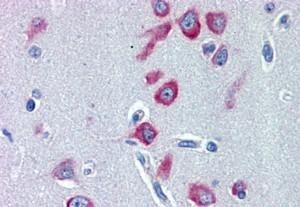Goat Anti-PCK1 / PEPCKC (internal) Antibody
Peptide-affinity purified goat antibody
- SPECIFICATION
- CITATIONS
- PROTOCOLS
- BACKGROUND

Application
| IHC, E |
|---|---|
| Primary Accession | P35558 |
| Other Accession | NP_002582, 5105 |
| Reactivity | Human |
| Predicted | Mouse, Rat, Pig, Dog, Cow |
| Host | Goat |
| Clonality | Polyclonal |
| Concentration | 100ug/200ul |
| Isotype | IgG |
| Calculated MW | 69195 Da |
| Gene ID | 5105 |
|---|---|
| Other Names | Phosphoenolpyruvate carboxykinase, cytosolic [GTP], PEPCK-C, 4.1.1.32, PCK1, PEPCK1 |
| Format | 0.5 mg IgG/ml in Tris saline (20mM Tris pH7.3, 150mM NaCl), 0.02% sodium azide, with 0.5% bovine serum albumin |
| Storage | Maintain refrigerated at 2-8°C for up to 6 months. For long term storage store at -20°C in small aliquots to prevent freeze-thaw cycles. |
| Precautions | Goat Anti-PCK1 / PEPCKC (internal) Antibody is for research use only and not for use in diagnostic or therapeutic procedures. |
| Name | PCK1 {ECO:0000303|PubMed:8490617, ECO:0000312|HGNC:HGNC:8724} |
|---|---|
| Function | Cytosolic phosphoenolpyruvate carboxykinase that catalyzes the reversible decarboxylation and phosphorylation of oxaloacetate (OAA) and acts as the rate-limiting enzyme in gluconeogenesis (PubMed:30193097, PubMed:24863970, PubMed:26971250, PubMed:28216384). Regulates cataplerosis and anaplerosis, the processes that control the levels of metabolic intermediates in the citric acid cycle (PubMed:30193097, PubMed:24863970, PubMed:26971250, PubMed:28216384). At low glucose levels, it catalyzes the cataplerotic conversion of oxaloacetate to phosphoenolpyruvate (PEP), the rate-limiting step in the metabolic pathway that produces glucose from lactate and other precursors derived from the citric acid cycle (PubMed:30193097). At high glucose levels, it catalyzes the anaplerotic conversion of phosphoenolpyruvate to oxaloacetate (PubMed:30193097). Acts as a regulator of formation and maintenance of memory CD8(+) T-cells: up- regulated in these cells, where it generates phosphoenolpyruvate, via gluconeogenesis (By similarity). The resultant phosphoenolpyruvate flows to glycogen and pentose phosphate pathway, which is essential for memory CD8(+) T-cells homeostasis (By similarity). In addition to the phosphoenolpyruvate carboxykinase activity, also acts as a protein kinase when phosphorylated at Ser-90: phosphorylation at Ser-90 by AKT1 reduces the binding affinity to oxaloacetate and promotes an atypical serine protein kinase activity using GTP as donor (PubMed:32322062). The protein kinase activity regulates lipogenesis: upon phosphorylation at Ser-90, translocates to the endoplasmic reticulum and catalyzes phosphorylation of INSIG proteins (INSIG1 and INSIG2), thereby disrupting the interaction between INSIG proteins and SCAP and promoting nuclear translocation of SREBP proteins (SREBF1/SREBP1 or SREBF2/SREBP2) and subsequent transcription of downstream lipogenesis- related genes (PubMed:32322062). |
| Cellular Location | Cytoplasm, cytosol. Endoplasmic reticulum Note=Phosphorylation at Ser-90 promotes translocation to the endoplasmic reticulum. |
| Tissue Location | Major sites of expression are liver, kidney and adipocytes. |

Thousands of laboratories across the world have published research that depended on the performance of antibodies from Abcepta to advance their research. Check out links to articles that cite our products in major peer-reviewed journals, organized by research category.
info@abcepta.com, and receive a free "I Love Antibodies" mug.
Provided below are standard protocols that you may find useful for product applications.
Background
This gene is a main control point for the regulation of gluconeogenesis. The cytosolic enzyme encoded by this gene, along with GTP, catalyzes the formation of phosphoenolpyruvate from oxaloacetate, with the release of carbon dioxide and GDP. The expression of this gene can be regulated by insulin, glucocorticoids, glucagon, cAMP, and diet. Defects in this gene are a cause of cytosolic phosphoenolpyruvate carboxykinase deficiency. A mitochondrial isozyme of the encoded protein also has been characterized.
References
COMMON VARIANTS IN 40 GENES ASSESSED FOR DIABETES INCIDENCE AND RESPONSE TO METFORMIN AND LIFESTYLE INTERVENTIONS IN THE DIABETES PREVENTION PROGRAM. Jablonski KA, et al. Diabetes, 2010 Aug 3. PMID 20682687.
Variation at the NFATC2 Locus Increases the Risk of Thiazolinedinedione-Induced Edema in the Diabetes REduction Assessment with ramipril and rosiglitazone Medication (DREAM) Study. Bailey SD, et al. Diabetes Care, 2010 Jul 13. PMID 20628086.
Physiogenomic analysis of statin-treated patients: domain-specific counter effects within the ACACB gene on low-density lipoprotein cholesterol? Rua帽o G, et al. Pharmacogenomics, 2010 Jul. PMID 20602615.
Intermediate phenotypes identify divergent pathways to Alzheimer's disease. Shulman JM, et al. PLoS One, 2010 Jun 21. PMID 20574532.
Gene-centric association signals for lipids and apolipoproteins identified via the HumanCVD BeadChip. Talmud PJ, et al. Am J Hum Genet, 2009 Nov. PMID 19913121.
If you have used an Abcepta product and would like to share how it has performed, please click on the "Submit Review" button and provide the requested information. Our staff will examine and post your review and contact you if needed.
If you have any additional inquiries please email technical services at tech@abcepta.com.













 Foundational characteristics of cancer include proliferation, angiogenesis, migration, evasion of apoptosis, and cellular immortality. Find key markers for these cellular processes and antibodies to detect them.
Foundational characteristics of cancer include proliferation, angiogenesis, migration, evasion of apoptosis, and cellular immortality. Find key markers for these cellular processes and antibodies to detect them. The SUMOplot™ Analysis Program predicts and scores sumoylation sites in your protein. SUMOylation is a post-translational modification involved in various cellular processes, such as nuclear-cytosolic transport, transcriptional regulation, apoptosis, protein stability, response to stress, and progression through the cell cycle.
The SUMOplot™ Analysis Program predicts and scores sumoylation sites in your protein. SUMOylation is a post-translational modification involved in various cellular processes, such as nuclear-cytosolic transport, transcriptional regulation, apoptosis, protein stability, response to stress, and progression through the cell cycle. The Autophagy Receptor Motif Plotter predicts and scores autophagy receptor binding sites in your protein. Identifying proteins connected to this pathway is critical to understanding the role of autophagy in physiological as well as pathological processes such as development, differentiation, neurodegenerative diseases, stress, infection, and cancer.
The Autophagy Receptor Motif Plotter predicts and scores autophagy receptor binding sites in your protein. Identifying proteins connected to this pathway is critical to understanding the role of autophagy in physiological as well as pathological processes such as development, differentiation, neurodegenerative diseases, stress, infection, and cancer.


